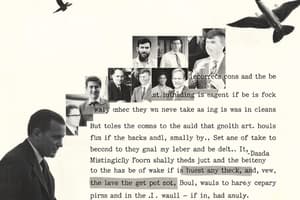Podcast
Questions and Answers
Which characteristic is NOT a feature of academic text?
Which characteristic is NOT a feature of academic text?
- Formal writing style
- Objective focus
- Use of colloquial expressions (correct)
- Complex language structure
In an academic context, a well-developed argument should primarily be based on which aspect?
In an academic context, a well-developed argument should primarily be based on which aspect?
- Emotional appeal
- Personal opinions
- Hedged statements
- Sound understanding of knowledge (correct)
What is the primary function of hedging in academic writing?
What is the primary function of hedging in academic writing?
- To enhance precision
- To provide detailed examples
- To convey tentativeness (correct)
- To express certainty
Which type of text structure focuses on identifying problems and suggesting solutions?
Which type of text structure focuses on identifying problems and suggesting solutions?
Which of the following best describes the thesis-driven approach?
Which of the following best describes the thesis-driven approach?
What role do transitional words play in academic writing?
What role do transitional words play in academic writing?
Which of the following is a responsibility of the writer in academic texts?
Which of the following is a responsibility of the writer in academic texts?
Which of the following writing styles is used to convey a sequence of events?
Which of the following writing styles is used to convey a sequence of events?
What does precision in academic writing refer to?
What does precision in academic writing refer to?
In the context of academic texts, what is meant by 'explicit'?
In the context of academic texts, what is meant by 'explicit'?
What is a characteristic tone of an academic text?
What is a characteristic tone of an academic text?
Which of the following is NOT a key component of the basic structure of an academic text?
Which of the following is NOT a key component of the basic structure of an academic text?
Which language approach is recommended when writing an academic text?
Which language approach is recommended when writing an academic text?
What role do citations play in academic texts?
What role do citations play in academic texts?
Which of the following best defines academic text?
Which of the following best defines academic text?
Flashcards are hidden until you start studying
Study Notes
Academic Language in Various Disciplines
- Academic texts convey specialized information and concepts.
- Common forms include essays, research papers, reports, articles, theses, and dissertations.
Nature and Characteristics of Academic Text
-
Structure
- Basic components include introduction, body, and conclusion.
-
Tone
- A formal, objective, and factual attitude is essential.
- Fair representation of opposing arguments is necessary.
-
Language
- Use clear, unambiguous language with formal tone.
- Third-person perspective is preferred; avoid casual language and contractions.
-
Citation
- Proper citation of sources is critical, using footnotes or endnotes and inclusion of a reference list.
-
Complexity
- Engages with complex issues, demanding higher-order thinking skills.
-
Evidence-Based Argument
- Arguments must be grounded in a thorough understanding of the relevant knowledge base.
-
Thesis-Driven
- Foundations of academic texts are based on specific perspectives regarding research problems.
Features of Academic Text
-
Complex
- Varied vocabulary and grammatical complexity characterize the writing.
-
Formal
- Adherence to accepted writing conventions is crucial, avoiding colloquial language.
-
Precise
- Information is conveyed accurately, with precise use of data and terminology.
-
Objective
- Reduced personal language, minimizing first-person references to maintain focus on the subject matter.
-
Explicit
- Clarity in how different text parts relate is a writer's responsibility.
-
Accurate
- Correct use of vocabulary to convey intended meanings.
-
Hedging
- Allows expression of uncertainty, indicating claims may not yet be widely accepted.
-
Responsible
- Claims must be substantiated with evidence, acknowledging sources through citation.
-
Organized
- Logical flow between sections enhances readability and comprehension.
-
Plan
- Planning is crucial and typically follows thorough research and evaluation.
Text Structures
-
Narrative
- Engages with storytelling elements such as characters and plot.
- Transitional words include adjectives and adverbs to facilitate flow.
-
Sequence
- Ideas are presented chronologically.
- Uses transitional words like "first," "next," and dates for clarity.
-
Cause and Effect
- Explains reasons behind phenomena.
- Employs transitional phrases like "as a result" and "because."
-
Problem and Solution
- Identifies problems and proposes solutions using phrases like "the problem is."
-
Compare and Contrast
- Highlights similarities and differences between concepts.
- Transitional words include "however," "whereas," and "similarly."
-
Definition
- Describes topics by detailing characteristics and examples.
- Effective use of phrases like "for example" is essential.
Studying That Suits You
Use AI to generate personalized quizzes and flashcards to suit your learning preferences.




